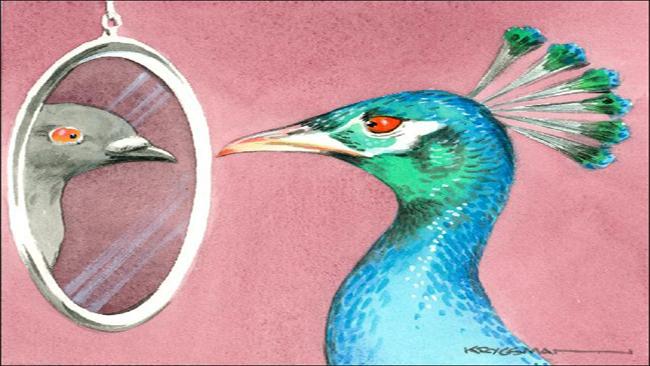
IT is customary when delivering a Labor speech to pause and acknowledge the traditional owners: the unsophisticated working-class folk who once inhabited the proletarian party.
Julia Gillard is assiduous, evoking the primal spirit of the light on the hill at every opportunity. The Prime Minister told the Australian Workers Union national conference earlier this year: "I'm a leader of the party called the Labor Party deliberately because that is what we come from. That is what we believe in and that is who we are."
When the Gillards stepped off the boat in 1966, the ALP was the domain of practically minded men and women, little given to reflection, who scratched a living through honest manual labor. Things were changing, however. The party's leader, Arthur Calwell, noted that a new faction had begun to assert itself, "composed of schoolteachers, barristers, doctors and other people with a university education".
He wasn't impressed. "I have nothing against a university education," he wrote. "But I have met many non-university-educated people who have displayed a much broader knowledge than the doctors, lawyers and economists and others who deserted their professions for politics."
As an institution that draws symbolic strength from its traditions, the Labor Party finds it almost impossible to acknowledge the profound change in its membership and culture that began with Gough Whitlam's ascendancy. To acknowledge Labor is prone to making a sharp turn in any direction would damage the brand of a party that claims to uphold universal and eternal values.
Yet if today's class war rhetoric sounds phony, it is because it is. Its advocates are not, by any stretch of the imagination, working-class people. They are the heirs of an extraordinary coup that took place in February 1967 when Whitlam replaced Calwell.
Two days before the ballot, Alan Ramsey and John Stubbs, writing in The Australian, cautioned that many in the party's rank and file considered Whitlam to be a class traitor, "an opportunist, a 'silvertail', a Liberal who has ratted on his own party".
Yet Whitlam somehow overcame the impediment of twin degrees to become the duly elected leader of the opposition with a teacher as his deputy and two more lawyers as leader and deputy in the upper house. The following morning, the second line in Ramsey's splash noted the historical significance: "It is a break from Labor tradition and a sweeping victory for the party's new-look politicians. None has a union background but three have a university education."
These days it is all but impossible to become a member of the political class without going to university. Many have worked for trade unions, for that is the well-worn career path to parliament, but few rise from the shop floor. Today's MPs are a different breed from the people they represent. In the seat of Maribyrnong, for example, fewer than 0.6 per cent of the adult population have a law degree, making their local member, Bill Shorten, a bit of an oddball. In the Labor Party caucus in Canberra, however, he is among friends: 36 per cent of Labor lower house members graduated in law.
Of the 71 Labor members, 61 are graduates -- 85 per cent -- compared with 25 per cent in the broader population. Tasmanian Dick Adams is a curiosity, a former meatworker and one of only a handful of Labor members with genuine working-class pretensions. He has not been at the forefront of the class-war debate.
The gentrification of the party by the pushy middle classes is Labor's guilty little secret. The singing of Solidarity Forever is an affectation, like Jerusalem on the last night of the Proms. The technocrats have taken over. They can quote John Curtin and Ben Chifley as often as they like, but there is no disguising the fact that they were members of a very different party. "John Curtin never suffered from the disability of a university degree and he was a highly intelligent and well-read man," Calwell wrote. "Curtin and Ben Chifley both left school when they were young boys, but they were better read men with a much wider general knowledge than most people with a university education."
The resignation of Simon Crean and Martin Ferguson from Gillard's cabinet may in time come to be seen as a turning point for the party. As former ACTU leaders old enough to remember the party as it once was, and smart enough to realise that it still needs the votes of working people, their removal from the highest echelons of the federal party is a significant loss.
Ferguson has been telling his colleagues since he entered parliament that it would be a mistake to repackage party as progressive or as a rainbow coalition of special interest groups. In 1999, two years before the rise of the Greens as a serious national political force, Ferguson wrote a tough and prescient foreword to Michael Thompson's book Labor Without Class. It made him unpopular with many in the party at the time, but the accuracy of his predictions is now clear for all to see.
"There is a view -- forcibly expressed in some quarters -- that the interests of narrow, well-mobilised groups have sometimes taken precedence over the interests and concerns of ordinary working people," he wrote.
"(Thompson's book) draws attention to the too often self-serving agendas of special interest groups, who are skilled at cloaking their self-interest in the language of compassion, and whose moral outrage is often levelled at fundamental working-class values such as hard work, independence and the traditional family." He concludes: "We must ask whom we truly represent."
Nick Cater's book, The Lucky Culture, will be published by HarperCollins in May.



